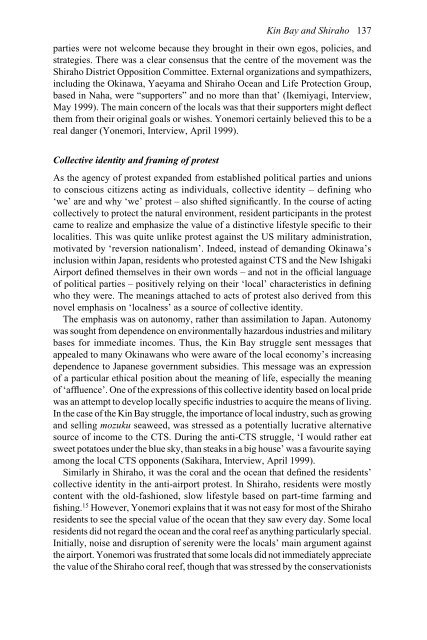Myth, Protest and Struggle in Okinawa
Myth, Protest and Struggle in Okinawa
Myth, Protest and Struggle in Okinawa
You also want an ePaper? Increase the reach of your titles
YUMPU automatically turns print PDFs into web optimized ePapers that Google loves.
K<strong>in</strong> Bay <strong>and</strong> Shiraho 137<br />
parties were not welcome because they brought <strong>in</strong> their own egos, policies, <strong>and</strong><br />
strategies. There was a clear consensus that the centre of the movement was the<br />
Shiraho District Opposition Committee. External organizations <strong>and</strong> sympathizers,<br />
<strong>in</strong>clud<strong>in</strong>g the Ok<strong>in</strong>awa, Yaeyama <strong>and</strong> Shiraho Ocean <strong>and</strong> Life Protection Group,<br />
based <strong>in</strong> Naha, were “supporters” <strong>and</strong> no more than that’ (Ikemiyagi, Interview,<br />
May 1999). The ma<strong>in</strong> concern of the locals was that their supporters might deflect<br />
them from their orig<strong>in</strong>al goals or wishes. Yonemori certa<strong>in</strong>ly believed this to be a<br />
real danger (Yonemori, Interview, April 1999).<br />
Collective identity <strong>and</strong> fram<strong>in</strong>g of protest<br />
As the agency of protest exp<strong>and</strong>ed from established political parties <strong>and</strong> unions<br />
to conscious citizens act<strong>in</strong>g as <strong>in</strong>dividuals, collective identity – def<strong>in</strong><strong>in</strong>g who<br />
‘we’ are <strong>and</strong> why ‘we’ protest – also shifted significantly. In the course of act<strong>in</strong>g<br />
collectively to protect the natural environment, resident participants <strong>in</strong> the protest<br />
came to realize <strong>and</strong> emphasize the value of a dist<strong>in</strong>ctive lifestyle specific to their<br />
localities. This was quite unlike protest aga<strong>in</strong>st the US military adm<strong>in</strong>istration,<br />
motivated by ‘reversion nationalism’. Indeed, <strong>in</strong>stead of dem<strong>and</strong><strong>in</strong>g Ok<strong>in</strong>awa’s<br />
<strong>in</strong>clusion with<strong>in</strong> Japan, residents who protested aga<strong>in</strong>st CTS <strong>and</strong> the New Ishigaki<br />
Airport def<strong>in</strong>ed themselves <strong>in</strong> their own words – <strong>and</strong> not <strong>in</strong> the official language<br />
of political parties – positively rely<strong>in</strong>g on their ‘local’ characteristics <strong>in</strong> def<strong>in</strong><strong>in</strong>g<br />
who they were. The mean<strong>in</strong>gs attached to acts of protest also derived from this<br />
novel emphasis on ‘localness’ as a source of collective identity.<br />
The emphasis was on autonomy, rather than assimilation to Japan. Autonomy<br />
was sought from dependence on environmentally hazardous <strong>in</strong>dustries <strong>and</strong> military<br />
bases for immediate <strong>in</strong>comes. Thus, the K<strong>in</strong> Bay struggle sent messages that<br />
appealed to many Ok<strong>in</strong>awans who were aware of the local economy’s <strong>in</strong>creas<strong>in</strong>g<br />
dependence to Japanese government subsidies. This message was an expression<br />
of a particular ethical position about the mean<strong>in</strong>g of life, especially the mean<strong>in</strong>g<br />
of ‘affluence’. One of the expressions of this collective identity based on local pride<br />
was an attempt to develop locally specific <strong>in</strong>dustries to acquire the means of liv<strong>in</strong>g.<br />
In the case of the K<strong>in</strong> Bay struggle, the importance of local <strong>in</strong>dustry, such as grow<strong>in</strong>g<br />
<strong>and</strong> sell<strong>in</strong>g mozuku seaweed, was stressed as a potentially lucrative alternative<br />
source of <strong>in</strong>come to the CTS. Dur<strong>in</strong>g the anti-CTS struggle, ‘I would rather eat<br />
sweet potatoes under the blue sky, than steaks <strong>in</strong> a big house’ was a favourite say<strong>in</strong>g<br />
among the local CTS opponents (Sakihara, Interview, April 1999).<br />
Similarly <strong>in</strong> Shiraho, it was the coral <strong>and</strong> the ocean that def<strong>in</strong>ed the residents’<br />
collective identity <strong>in</strong> the anti-airport protest. In Shiraho, residents were mostly<br />
content with the old-fashioned, slow lifestyle based on part-time farm<strong>in</strong>g <strong>and</strong><br />
fish<strong>in</strong>g. 15 However, Yonemori expla<strong>in</strong>s that it was not easy for most of the Shiraho<br />
residents to see the special value of the ocean that they saw every day. Some local<br />
residents did not regard the ocean <strong>and</strong> the coral reef as anyth<strong>in</strong>g particularly special.<br />
Initially, noise <strong>and</strong> disruption of serenity were the locals’ ma<strong>in</strong> argument aga<strong>in</strong>st<br />
the airport. Yonemori was frustrated that some locals did not immediately appreciate<br />
the value of the Shiraho coral reef, though that was stressed by the conservationists
















